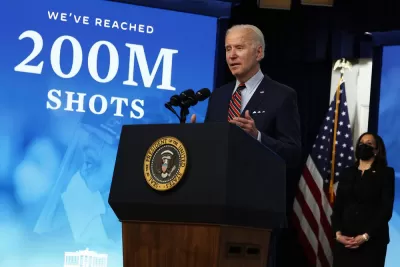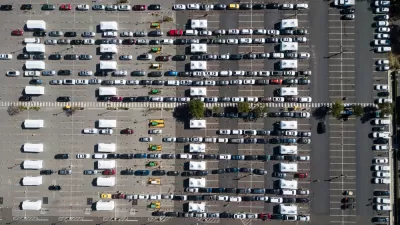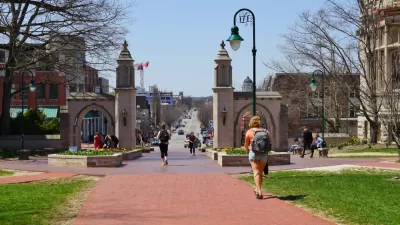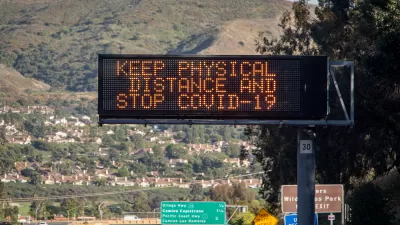Over 100 million eligible Americans have chosen not to be inoculated against COVID-19, posing a risk to vaccinated and unvaccinated alike. A July 4th White House celebration was a "missed opportunity" to model health policies, opines one expert.

The media was quick to note on July 4 that President Joe Biden had fallen short of his goal to vaccinate 70% of American adults by July 4. [On July 10, the Centers for Disease Control and Prevention vaccination dashboard indicated that 67.5% of adults had received at least one dose.] Leana S. Wen, an emergency physician and visiting professor at the George Washington University’s Milken School of Public Health, was less focused on the percentage and more on the administration's strategy for achieving it.
"President Biden missed an important opportunity on the Fourth of July by holding an event at the White House that did not require its more than 1,000 attendees to be vaccinated," opined Wen, also a Washington Post contributing columnist and CNN medical analyst.
The celebration could have been a chance to show that vaccination isn’t just an individual decision, but one that affects the health of others — including those already vaccinated.
Rather than requiring participants to show a vaccination verification, e.g., their CDC COVID-19 vaccination card, or digital verification like New York's Excelsior Pass or California's Digital COVID-19 Vaccine Record or even to "self-attest" to being fully vaccinated, the Biden administration opted to continue the Trump administration's practice of relying on rapid testing to prevent viral transmission during the event.
The Washington Post reported on July 3:
Biden’s event Sunday will be the largest to date at the White House during his tenure. Guests will include essential workers along with military families, and everyone will be required to take a coronavirus test, according to White House press secretary Jen Psaki. Those who are fully vaccinated will not be required to wear masks.
The importance of vaccination verification
Appearing on CNN Newsroom on July 8, host Jim Sciutto asked Wen why it's time for President Biden to consider vaccine mandates.
In her column, Wen does not call for the White House to mandate vaccines but "assist with the efforts" of other entities, such as employers, including hospitals, and universities, to mandate them.
"There is this narrative that the Biden administration and many others have been putting out, which is, once you're vaccinated, you're fine," answers Wen (see transcript).
And so the natural conclusion from that is, why would you care if others around you are vaccinated or not? If you're protected, then why not let everybody else just do whatever they want?
In a recent post about new data showing a decline in the effectiveness of the Pfizer vaccine, White House COVID-19 Response Coordinator Jeff Zients made this exact point: "If you have been fully vaccinated, you are protected. If you're not vaccinated, you are not protected," Zients told Dana Bash, host of CNN's State of the Union, in an interview on Sunday, July 4.
Prolonging the pandemic
Wen continued, noting how unvaccinated people in the U.S. will prolong the pandemic.
The fact, though, is that the unvaccinated also affect the vaccinated. If you are a vaccinated person, but you're living among a lot of unvaccinated individuals, as [CNN health reporter] Elizabeth Cohen was just showing in these clusters, your chance of having a breakthrough infection increases.
Your chance to infecting others around you who are unvaccinated also increases. And, by the way, the more unvaccinated people there are, the longer this pandemic is going to be.
Wen ended her column (source article) by writing that the administration's newly announced strategy of door-to-door outreach to increase vaccinations, which has received pushback from some Republican governors in hard-hit states, is "not nearly enough."
Biden needs to get behind proof of vaccination, starting with his own White House events. A gathering touting the United States’ progress toward independence from the virus should have been the ideal opportunity to make the case for vaccine requirements. It matters for everyone, including the vaccinated.
Other experts concur
Wen is certainly not alone in faulting the administration for not going further to get Americans vaccinated, as The New York Times reported on July 6.
"Dr. Ezekiel J. Emanuel, a professor of bioethics and health policy at the University of Pennsylvania, said the United States was unlikely to make significant strides in its vaccination campaign without mandates," wrote Michael D. Shear and Noah Weiland.
“I like to say a mandate is legal, ethical and efficacious,” he said. “Ultimately, workplaces are probably going to have to.”
However, Reuters reported that the Biden administration instructed federal government agencies on June 10 not to require worker vaccinates. Weiland and Shear add that the "Biden administration considered and rejected calls to require a federal vaccine passport, a move that some experts said would help contain the spread of the virus by allowing people to prove that they had been inoculated."
FDA approval vs. authorization
"There’s one thing that could make an immediate impact on vaccine uptake: Granting full FDA approval to Pfizer’s shot," writes Washington Post researcher Alexandra Ellerbeck on July 6.
It’s been eight weeks since Pfizer and BioNTech applied to the Food and Drug Administration for full approval of their coronavirus vaccine, but the agency has yet to act. Pressure is growing for the FDA to move faster to license the vaccine.
The lack of full authorization has been a core part of the messaging and litigation strategy of anti-vaccine groups. And while a federal judge upheld at least one large Texas hospital’s mandate for its employees, many employers are cautious about inviting litigation.
101 million eligible Americans yet to be vaccinated
The CDC recommends everyone 12 years and older should get a COVID-19 vaccination to help protect against COVID-19.
As of July 10, 183,836,917 Americans had received at least one shot of an authorized COVID-19 vaccine. Subtracting that number from 333,007,229 equals 149,170,312 unvaccinated Americans, including 48 million children in America aged 0-11 who are ineligible to be vaccinated at this time.
That leaves 101 million Americans who have chosen (or their parents have chosen for them) to not be vaccinated against COVID-19.
Related posts:
- Coronavirus Litigation: Can Employers Require Employee Vaccinations? June 10, 2021
- Will CDC's Revised Guidance for Fully Vaccinated People Prolong the Pandemic? May 17, 2021
Hat tip to Jim Sciutto.
FULL STORY: Opinion: It’s time for Biden to make the case for vaccine requirements

Planetizen Federal Action Tracker
A weekly monitor of how Trump’s orders and actions are impacting planners and planning in America.

Maui's Vacation Rental Debate Turns Ugly
Verbal attacks, misinformation campaigns and fistfights plague a high-stakes debate to convert thousands of vacation rentals into long-term housing.

San Francisco Suspends Traffic Calming Amidst Record Deaths
Citing “a challenging fiscal landscape,” the city will cease the program on the heels of 42 traffic deaths, including 24 pedestrians.

Defunct Pittsburgh Power Plant to Become Residential Tower
A decommissioned steam heat plant will be redeveloped into almost 100 affordable housing units.

Trump Prompts Restructuring of Transportation Research Board in “Unprecedented Overreach”
The TRB has eliminated more than half of its committees including those focused on climate, equity, and cities.

Amtrak Rolls Out New Orleans to Alabama “Mardi Gras” Train
The new service will operate morning and evening departures between Mobile and New Orleans.
Urban Design for Planners 1: Software Tools
This six-course series explores essential urban design concepts using open source software and equips planners with the tools they need to participate fully in the urban design process.
Planning for Universal Design
Learn the tools for implementing Universal Design in planning regulations.
Heyer Gruel & Associates PA
JM Goldson LLC
Custer County Colorado
City of Camden Redevelopment Agency
City of Astoria
Transportation Research & Education Center (TREC) at Portland State University
Jefferson Parish Government
Camden Redevelopment Agency
City of Claremont





























